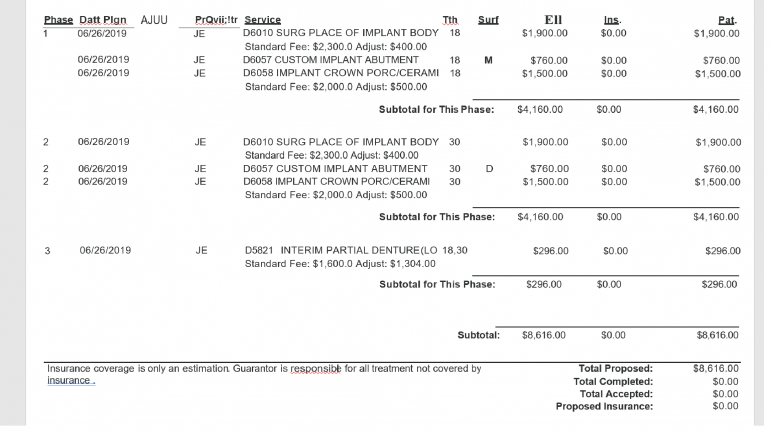
Dental Code D6057: Custom fabricated abutment – includes placement
Dental code D6057 refers to the custom fabrication and placement of an abutment, an essential component of dental implants. The Dental code D6057 plays a crucial role in ensuring the success of implant procedures by encompassing the custom fabrication and placement of abutments. An abutment serves as a vital connector between the dental implant fixture and the prosthetic tooth restoration, such as a crown, bridge, or denture.
A prefabricated abutment may be sufficient for many cases, offering convenience and cost-effectiveness. However, certain situations call for a more customized approach to ensure an ideal fit, functionality, and esthetics. Dental code D6057 encompasses the process of creating and placing a custom-fabricated abutment that is tailored to the patient's specific requirements.
Price range for Dental Code D6057: Custom fabricated abutment – includes placement
As with other services, prices in America vary from dentist to dentist and city to city. The minimum charge for this service is $650 and the maximum $1300. Most dentists charge around $865.
Low cost of living | Medium cost of living | High cost of living |
Memphis (Tennessee), Cincinnati (Ohio) | Miami (Florida), Denver (Colorado), Austin (Texas) | (New York (New York), San Francisco (California) |
$650 | $865 | $1300 |
Dental Code D6057: Steps of the dental procedure
D6057 represents a specific dental procedure involving the creation and placement of a custom-fabricated abutment. An abutment serves as a connector between the dental implant fixture and the prosthetic tooth restoration, such as a crown, bridge, or denture. This code typically applies to cases where a prefabricated abutment does not meet the patient's anatomical or aesthetic requirements, necessitating a custom-fabricated solution.
Initial Assessment and Treatment Planning
The process begins with an initial assessment, where the dentist evaluates the patient's oral health, examines the site for implant placement, and considers various factors like bone quality, quantity, and adjacent teeth alignment. This assessment helps determine if a custom abutment is necessary for optimal implant success.
Implant Placement
Once the treatment plan is established, the dentist performs the surgical placement of the dental implant fixture into the jawbone. This procedure is typically done under local anesthesia, ensuring patient comfort. The implant is strategically positioned to ensure long-term stability and support for the custom abutment and prosthetic restoration.
Healing and Osseointegration
After implant placement, a healing period is necessary to allow the implant to fuse with the surrounding bone through a process called osseointegration. This period typically lasts several months, during which the patient's bone tissue integrates with the implant, providing a strong foundation for the abutment and restoration.
Impression Making
Once the osseointegration is complete, the dentist takes an impression of the implant site and surrounding teeth. This impression serves as a blueprint for the custom fabrication of the abutment and the final restoration.
Custom Abutment Fabrication
Using the impression, a dental laboratory fabricates a custom abutment that matches the patient's unique oral anatomy and provides an optimal fit. The abutment is crafted from biocompatible materials, such as titanium or zirconia, to ensure durability and compatibility with the surrounding tissues.
Abutment Placement
Once the custom abutment is ready, the dentist carefully places it onto the implant fixture. The abutment is precisely positioned to achieve proper alignment, emergence profile, and support for the final prosthetic restoration.
Final Restoration
After the abutment placement, the dentist proceeds with the fabrication and placement of the final prosthetic restoration, such as a crown, bridge, or denture. This restoration is custom-designed to blend seamlessly with the patient's natural teeth, providing functional and aesthetic benefits.
Summary of Dental code D6057
Dental code D6057 represents the custom fabrication and placement of an abutment, an integral part of dental implant procedures. Through a series of steps, including initial assessment, implant placement, healing, impression making, custom abutment fabrication, abutment placement, and final restoration, the dentist ensures a precise fit and optimal functionality for the patient. Custom-fabricated abutments offer advantages in cases where prefabricated options do not meet the patient's specific needs, enhancing both esthetics and long-term implant success.
While dental costs may vary, it is important to search for the best price. By comparing multiple dental providers with Dr. BestPrice, you can find the best value for your treatment needs.
